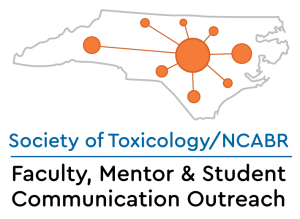The Society of Toxicology (SOT) and the North Carolina Regional Chapter of SOT (NCSOT) have partnered with the North Carolina Association for Biomedical Research (NCABR) to promote toxicology messages in undergraduate education in North Carolina. This is part of SOT’s extensive efforts to create a safer and healthier world by advancing the science and increasing the impact of toxicology.
The SOT/NCABR Faculty, Mentor & Student Communication Outreach program has the following objectives:
- To increase North Carolina undergraduate student involvement in local and national SOT programs;
- To increase North Carolina undergraduate student usage of SOT educational and mentoring resources; and
- To increase the usage of educational materials in North Carolina undergraduate science courses that address the importance and meaning of toxicology.
This program involves multiple North Carolina academic institutions (private and public), non-academic organizations in government and industry, SOT Faculty United for Toxicology Undergraduate Recruitment and Education (FUTURE) Committee and the North Carolina SOT Regional Chapter.
In fall of 2020, the North Carolina Higher Education Faculty and Mentor Network was formed to help facilitate the understanding of toxicological principles, encourage undergraduate faculty to incorporate toxicology in their teaching, increase awareness among undergraduates of the value of the interdisciplinary science of toxicology, and foster a well-trained pool of scientists capable of meeting needs in environmental and biomedical sciences.
For Undergraduate Teaching Faculty
Enrich Undergraduate Science Courses and Career Planning
The North Carolina Higher Education Faculty and Mentor Network consists of North Carolina faculty and toxicologists who have joined together to increase the awareness among undergraduates of the value of the interdisciplinary science of toxicology to society and foster a well-trained pool of scientists capable of meeting needs in environmental and biomedical sciences.
Who Should Participate in the Network?
- STEM faculty (biology, chemistry, math, physics, biomedical engineering, etc.) at North Carolina institutions who primarily teach undergraduate students are invited to join the Network. Toxicology concepts will enrich the breadth of STEM fields. Faculty do not need to be SOT members or teach toxicology.
Why Should You Participate?
- SOT will facilitate your use of free educational materials and guest speakers to enrich a variety of undergraduate virtual and in-person courses.
- SOT mentors will support student exploration of internships and well paid and rewarding career options in biomedical and environmental sciences.
Network Objectives are to:
- Support communication of important principles that make the world a safer and healthier place.
- Provide valuable teaching resources for faculty in North Carolina.
- Offer mentoring of North Carolina undergraduates to meet critical workforce needs by increasing the awareness of toxicology and the pursuit of environmental and biomedical sciences careers.
Network Undergraduate Faculty Responsibilities:
- Incorporate SOT educational materials and toxicology principles in undergraduate instruction.
- Participate with your students in NC SOT Regional Chapter undergraduate activities.
- Host periodic (monthly or quarterly) meetings with undergraduate students interested in toxicology.
- Identify courses and student STEM organizations to host an SOT ToxScholar or Network mentor who can discuss toxicology careers and the value of toxicology to society.
- Educate undergraduate students about SOT awards, programs, and opportunities.
Time Commitment for Network Faculty Members:
- Participate in the fall NC SOT Regional Chapter meeting (~8 hours)
- Arrange and engage in periodic meetings with undergraduate students interested in toxicology
- Integrate toxicological principles and SOT resources into course curriculum
- Keep apprised of periodic email updates from SOT/NCABR and attend virtual planning meetings to share updates, resources, and ideas for and lessons learned from growing and fostering the Network.
For Mentors
Promote Toxicology and to Mentor Undergraduate Faculty and Students
The mentors in the North Carolina Higher Education Faculty and Mentor Network are volunteers in varied toxicology-related careers, from research to those engaged in safety evaluation, policy, regulation, science communication, and other areas. Undergraduate faculty from North Carolina institutions are also part of the Network. Together they will increase the understanding of toxicological principles, encourage undergraduate faculty to incorporate toxicology in their teaching, increase awareness among undergraduates of the value of the interdisciplinary science of toxicology, and foster a well-trained pool of scientists capable of meeting needs in environmental and biomedical sciences.
Who Should Participate as Network Mentors?
Toxicologists from industry, government, academia, and nonprofit research organizations who have a passion for the discipline and are willing to:
- Mentor North Carolina undergraduates.
- Support undergraduate faculty through real-world examples valuable in course instruction.
- Provide connections to research opportunities and other professional development opportunities.
Why Should You Participate?
- Reward of sharing insights from their own careers in toxicology with the next generation of toxicologists.
- Satisfaction from increasing knowledge of principles important to maintaining a safer and healthier world.
- Help shape a robust and diverse science workforce.
Network Objectives are to:
- Support communication of important principles that make the world a safer and healthier place.
- Provide valuable teaching resources for faculty in North Carolina.
- Offer mentoring of North Carolina undergraduates to meet critical workforce needs by increasing the awareness of toxicology and the pursuit of environmental and biomedical careers.
Network Mentor Responsibilities:
- Engage in periodic meetings with faculty and undergraduate students about toxicology, careers, research opportunities, and graduate training.
- Share information about toxicology, SOT awards, programs, and opportunities.
- Provide job shadowing experience.
- Participate in Network-related NCSOT Regional Chapter activities.
- Keep apprised of periodic email updates from SOT/NCABR and to attend periodic virtual planning meetings to share updates, resources, ideas for and lessons learned from growing and fostering the Network.


